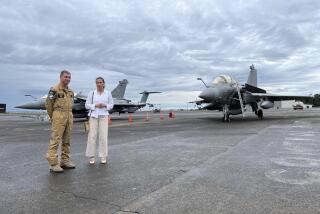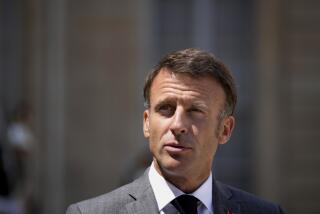Paris Won’t Patrol New Part of ‘No-Fly’ Zone
PARIS — French President Jacques Chirac on Thursday rebuffed Secretary of State Warren Christopher’s plea for help in enforcing the expanded “no-fly” zone in southern Iraq, dashing U.S. hopes of refurbishing the Persian Gulf War coalition.
In a statement issued by Chirac’s office following the French president’s hourlong meeting with Christopher, the French government said its warplanes will resume patrolling Iraqi airspace south of the 32nd parallel, the boundary of the “no-fly” zone before President Clinton enlarged it this week up to Baghdad’s southern suburbs. But the French declined to patrol between the 32nd and 33rd parallels, the area that was added.
Nevertheless, State Department spokesman Nicholas Burns said Christopher was pleased with the outcome of the meeting, because France agreed not to pull out entirely from the coalition with Britain and the United States that has been enforcing two “no-fly” zones over Iraq since shortly after the 1991 Gulf War. American officials said the more drastic step had been under consideration.
French planes have not operated in the northern “no-fly” zone, which covers Kurdish territory, or flown north of the 30th parallel in the zone covering the largely Shiite Muslim south, since the U.S. missile attacks and Clinton’s expansion of the southern zone. French officials described the suspension as a protest against the U.S. actions.
The French issued their three-sentence statement without first showing it to the U.S. side, as diplomatic courtesy dictates. That immediately produced a new Washington-Paris dispute, demonstrating the extent of the damage done to the often prickly relationship by the unilateral U.S. decisions regarding Iraq.
France said it had agreed to resume full air operations because Christopher “confirmed the end of the American operation ‘Desert Strike’ in Iraq.” But Burns disputed the French interpretation. He said Christopher did not promise, in order to get French planes back on full patrol, that there would be no more missile strikes. He said Christopher only told the French that the operation had achieved its purpose, not that it was definitely over.
“The United States does retain all options for the future to counter aggression by [Iraqi President] Saddam Hussein,” Burns added.
The French government said its warplanes would not resume full air operations in Iraq until Monday, probably to make sure that U.S. attacks do not resume.
Before Christopher’s meeting with Chirac, U.S. officials said Washington was very anxious to obtain French participation in policing the enlarged zone, although the United States and Britain “are fully capable of enforcing” the “no-fly” policy without additional help.
Christopher flew to Paris after a happier meeting earlier Thursday in London with British Foreign Secretary Malcolm Rifkind. During a joint news conference with Christopher, Rifkind said: “It is crucially necessary that, whenever [Hussein] initiates either repression or aggression, that he should end up losing more than he thinks he has gained.”
Meanwhile, international criticism of the United States’ unilateral actions against Iraq continued Thursday, according to news agency reports:
* Russian security chief Alexander I. Lebed said the United States is behaving like a “bull in a china shop.” Lebed accused Clinton of ordering the attacks to enhance his chances in the November election.
* Chinese Foreign Ministry spokesman Shen Guofang, briefing reporters in Beijing, said China expressed “strong displeasure” over the U.S. missile attacks and urged both the United States and Iraq to end their military actions.
* Egyptian commentator Nabil Omar, writing in the government newspaper Al Ahram, said: “Since it reached the apex of the pyramid in the new world order, the United States has been adopting the behavior of the cowboy and the quarrelsome bully in every international crisis.”
* The government of Pakistan ordered increased security at U.S. and British diplomatic missions in Islamabad and Lahore. Demonstrators opposed to the U.S. actions had thrown stones at the U.S. Consulate in Lahore on Wednesday.
* Demonstrators in Dhaka, the Bangladeshi capital, burned Clinton in effigy.
More to Read
Sign up for Essential California
The most important California stories and recommendations in your inbox every morning.
You may occasionally receive promotional content from the Los Angeles Times.










